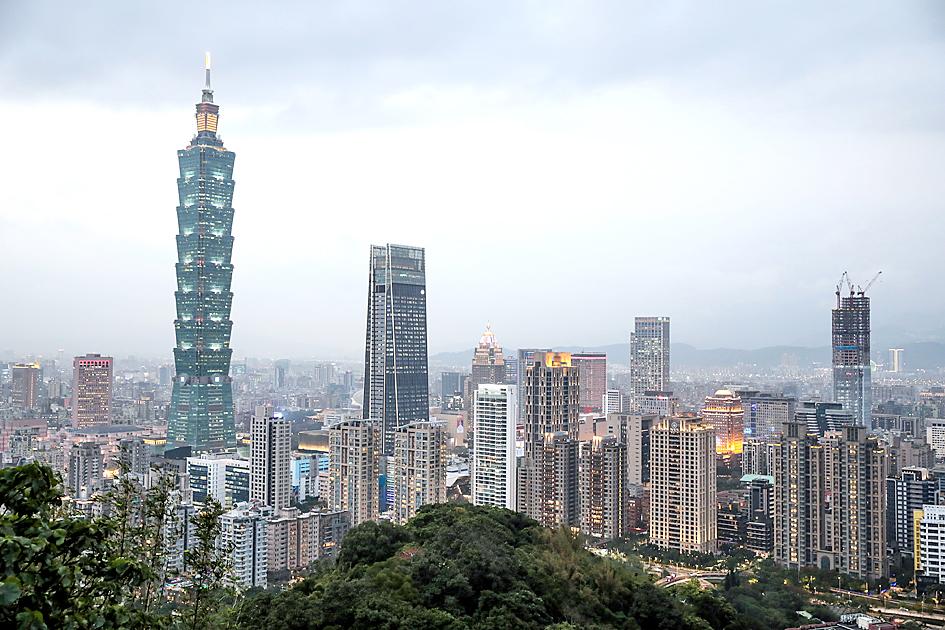Housing transactions last year hit a seven-year high, as the market recovered steadily from the introduction of a property gains tax in 2016, government data showed on Tuesday.
Data released by the Ministry of the Interior showed housing transactions recovering from a low of 245,396 units in 2016 to 326,589 units last year.
The recovery had been gradual, but resilient, despite the COVID-19 pandemic last year and renewed credit controls imposed by the central bank early last month, Sinyi Realty Inc (信義房屋) said in a news release.

Photo: Cheng I-hwa, Bloomberg
Transactions last month rose to a 60-month high of 35,000 units, reflecting a hot market in November, as it takes about a month to process related paperwork, Sinyi research manager Tseng Ching-der (曾進德) said.
The central bank reiterated that the latest credit controls would not affect people seeking to buy their first home, but it remains to be seen how the market adapts to the tightening, analysts said.
The latest government data also showed that the number of inherited properties rose 2.5 percent year-on-year to 59,109 units last year, the highest on record, while the number of gifted houses edged down 0.4 percent to 43,759 units, the first decline since 2016.
Outstanding mortgages last month increased 8.5 percent from a year earlier to NT$8.04 trillion (US$283.3 billion), central bank data showed on Tuesday.
The pace of increase was the fastest in 14 years, the bank said, attributing it to the high sales season ahead of the Lunar New Year holiday next month.
Outstanding loans for construction and land financing soared 17.52 percent year-on-year to NT$2.46 trillion last month, the fastest increase since September 2011, the bank’s data showed.
Seasonality aside, the government’s encouragement of urban renewal projects contributed to the pickup, as credit controls do not apply to urban renewal projects, the bank said.
Tseng said that given the time lag, this month’s mortgage and property transaction data would be a better indication of the effects of credit controls.

SELL-OFF: Investors expect tariff-driven volatility as the local boarse reopens today, while analysts say government support and solid fundamentals would steady sentiment Local investors are bracing for a sharp market downturn today as the nation’s financial markets resume trading following a two-day closure for national holidays before the weekend, with sentiment rattled by US President Donald Trump’s sweeping tariff announcement. Trump’s unveiling of new “reciprocal tariffs” on Wednesday triggered a sell-off in global markets, with the FTSE Taiwan Index Futures — a benchmark for Taiwanese equities traded in Singapore — tumbling 9.2 percent over the past two sessions. Meanwhile, the American depositary receipts (ADRs) of Taiwan Semiconductor Manufacturing Co (TSMC, 台積電), the most heavily weighted stock on the TAIEX, plunged 13.8 percent in

A wave of stop-loss selling and panic selling hit Taiwan's stock market at its opening today, with the weighted index plunging 2,086 points — a drop of more than 9.7 percent — marking the largest intraday point and percentage loss on record. The index bottomed out at 19,212.02, while futures were locked limit-down, with more than 1,000 stocks hitting their daily drop limit. Three heavyweight stocks — Taiwan Semiconductor Manufacturing Co (TSMC, 台積電), Hon Hai Precision Industry Co (Foxconn, 鴻海精密) and MediaTek (聯發科) — hit their limit-down prices as soon as the market opened, falling to NT$848 (US$25.54), NT$138.5 and NT$1,295 respectively. TSMC's

TARIFFS: The global ‘panic atmosphere remains strong,’ and foreign investors have continued to sell their holdings since the start of the year, the Ministry of Finance said The government yesterday authorized the activation of its NT$500 billion (US$15.15 billion) National Stabilization Fund (NSF) to prop up the local stock market after two days of sharp falls in reaction to US President Donald Trump’s new import tariffs. The Ministry of Finance said in a statement after the market close that the steering committee of the fund had been given the go-ahead to intervene in the market to bolster Taiwanese shares in a time of crisis. The fund has been authorized to use its assets “to carry out market stabilization tasks as appropriate to maintain the stability of Taiwan’s

In a small town in Paraguay, a showdown is brewing between traditional producers of yerba mate, a bitter herbal tea popular across South America, and miners of a shinier treasure: gold. A rush for the precious metal is pitting mate growers and indigenous groups against the expanding operations of small-scale miners who, until recently, were their neighbors, not nemeses. “They [the miners] have destroyed everything... The canals, springs, swamps,” said Vidal Britez, president of the Yerba Mate Producers’ Association of the town of Paso Yobai, about 210km east of capital Asuncion. “You can see the pollution from the dead fish.